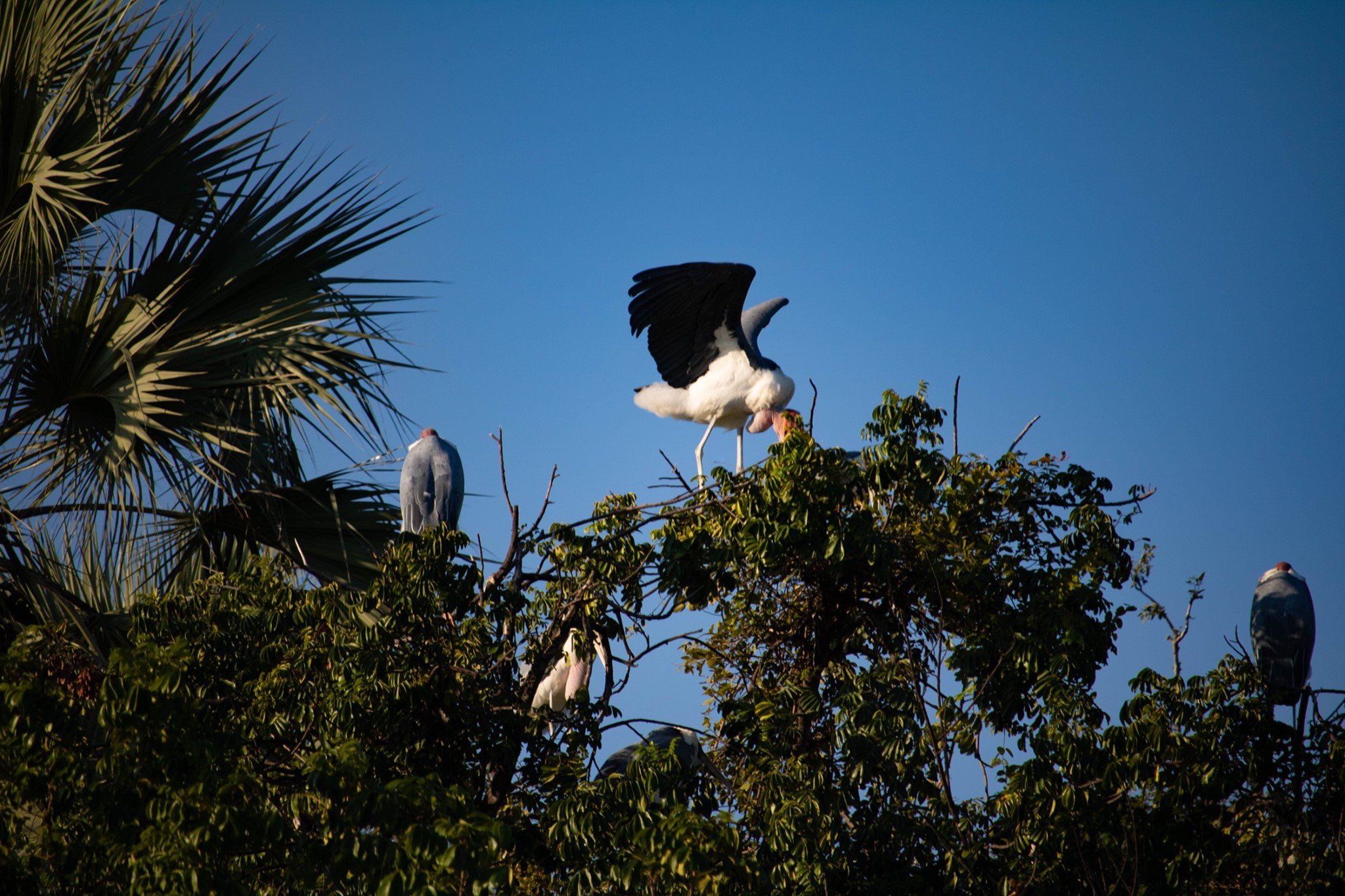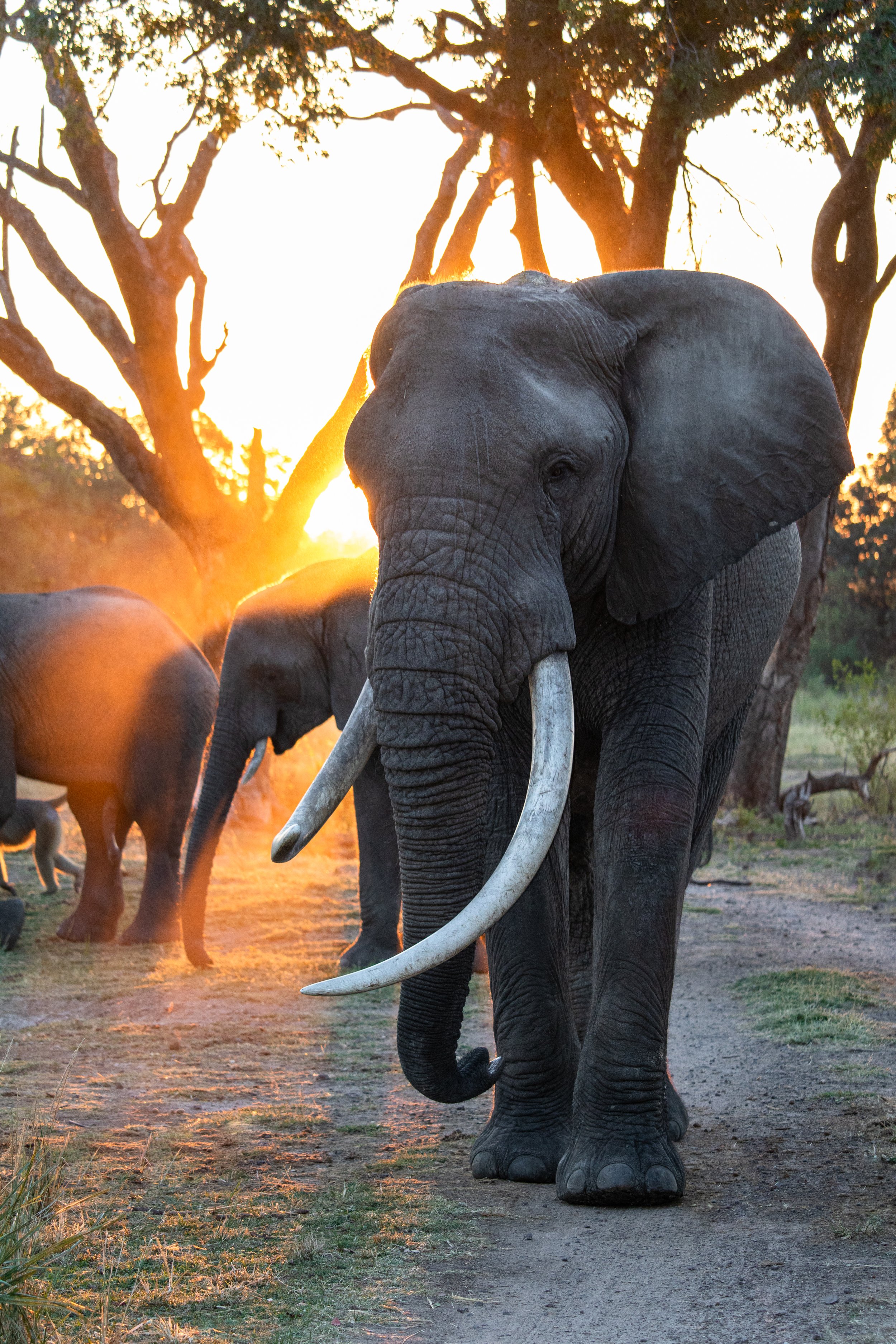The Elephant Café
I recently had the pleasure of visiting The Elephant Cafe in Zambia. Advertised as “A 5 star Livingstone Restaurant Providing the Ultimate Dining Experience on the banks of the Zambezi”, this spot is so much more than just a culinary experience. There’s no doubt the food was fantastic, but you don’t exactly go to a place called The ELEPHANT Cafe because you’re hoping for some stellar risotto. You go for the elephants.
Before you get to the elephants, however, you have the option to be transported from your accommodation to the Cafe by boat, allowing you to see incredible wildlife from a very special vantage point. The captain of our boat was fantastic and allowed for many stops along the way. Two of these stops ended up providing some of my favorite sights from the whole trip: seeing nesting Maribou stork and watching a giraffe get seemingly lightheaded from standing up too quickly after drinking from the Zambezi River. Once I was finished taking a ridiculous amount of pictures of all those other animals, it was time to see the elephants!
Nesting Maribou Stork
Pulling up to the Cafe, I could hardly control my excitement. I had read everything there was to possibly read about this experience, seen photos & videos from friends who had done it first-hand, and was READY. Elephants have always been my favorite animal (ask me that when I’m staring at a manatee and you may get a different answer- but, ok, we’ll call it a draw) and now I was getting the chance to meet a herd up-close and feed them some snacks.
After meeting the staff and going over the rules, it was time. I was given a bag full of snacks, and chose the elephant I would like to meet first. Each elephant had a dedicated trainer who told us the best way to interact with the individual. It was incredible. I got to feel an elephant’s trunk. I got to put food in its trunk and watch the transfer to its mouth. I got to feel the different personalities of each elephant through their trunks (sounds bizarre, I know!) and how they received their food. The baby (calf) was all over the place, the mature female was very calm and patient, and the bull “Bop” was an insatiable vacuum.
Once the food had run dry (I’m looking at you, Bop) and the sun was going down, it was time for the elephants to go into their barn. Like a well-choreographed ballet, the elephants followed each other into the barn, with a wild hippo as the caboose. (This one hippo apparently comes out of the water each night to join the elephants in their barn, on his own free will). In fact, all of the elephants enter on their own free will, as well.
The Elephant Cafe has trained their elephants using positive reinforcement techniques. This means that if they do what the trainer has asked, the elephant gets a reward. Most often this is in the form of food (because, let’s be real, who isn’t food motivated?!) but can also be in the form of verbal or tactile praise (scratches, anyone?) The elephants never get punished for not doing what the trainer has asked.
Positive reinforcement training is arguably the best way to form a relationship with an animal (think about how you trained your dog – you likely gave a “good boy/girl”, a treat, and pat on the head as they did what you asked.) By using this technique there is a strong sense of trust between the elephant and the trainer, and the results are incredible. All the trainer had to do was ask the elephants to head into the barn and off they went. No physical contact was needed, and the strong bond between trainer and elephant remained.
In a world where photo-sharing apps reign supreme and the phrase “do it for the gram” is all-too-real, it can be hard to wade through all of the different experiences in the tourism industry. There are, unfortunately, some places that do exploit animals to make money in order to provide guests with the “perfect photo”. This is problematic for two reasons: 1- the obvious: exploiting animals. 2- the companies doing it right (without mistreating animals) get lumped into the same category and getting pushed out of existence when perhaps they’re needed the most.
If there is one piece of advice I can give to tourists (and even those discovering new opportunities in the places they call home) it’s: do your research. How do you know you’re visiting a responsible wildlife tourism spot?
Determine if the company uses positive reinforcement training.
Check out any accreditations the company may have.
Read about others’ experiences at the place you’d like to go.
Figure out how many people are allowed to do the interaction a day – generally speaking, the fewer people the better.
Proceed with caution when you see animal interactions advertised as offering the “perfect shot” or “Instagram-worthy”.
I truly believe that positive animal interaction experiences, such as those at The Elephant Cafe, can inspire people to take action to protect species such as the African elephant. If you were wishy-washy about elephants before, didn’t much care for them or know much about them, I have no doubt you’d leave this experience with a new found respect. And where there’s respect there’s potential to protect. And as we journey through this Anthropocene, we’re going to need as many voices as possible for the creatures that have called this planet home for 55 million years.


